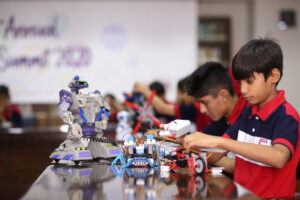Tuesday
3 Nov21st Century Education for Pakistan
You will find pre-schools in Pakistan even making claims of 21st century education. No one bothers to know why such ‘kind of reality’ needs to be created for our kids when Pakistan is still considered a developing country. A place where indigenous industries, like agriculture and fishing, use primitive means to feed more than 220 million population. Such ‘dilemmas’ are mocked at mostly.

TCS – The Creative Schools has recently kick-started a webinar series in its effort to participate in the national as well as international dialogue on emerging challenges in the so-called 21st century education to further the solutions for vulnerable masses. Of course, we did consider the on-going debate on Single National Curriculum – SNC, surrounding the inclusivity and equal access to quality education for children with various financial and ethnic statuses.
However, we were perplexed about the idea and at the same time motivated to explain what it should mean for our kids to have the education of new age. The topic of the webinar, as evident as it seems concerned finding the rationale behind modern education. Ayesha Usman was our guest speaker, who possesses a vast experience of working with international organizations and has held prestigious positions at the International Forum on Education and International Muslim Women Union.
As an innate philosopher, educationist, and reformer, she explained the essential ingredients which are ‘supposed’ to be present in any kind of education system anywhere in the world. She made a point that when every skill, competency or pedagogy revolves around literacy, it is indispensable as so that we consider different aspects of this critical phenomenon.
Foundational literacy helps a child get a solid grip on the subject. In contrast, functional literacy assists in making sense of the knowledge and empower a kid with useful tools to navigate around a topic. Both are important and should ultimately guide through from the attainment of skills and competencies that are critical to surviving in the technological boom and of changing roles in the job market.
But at the same time, she explained that institutions take for granted the relevance of interpersonal or the survival skills that embody in entrepreneurship and the will of the schools to give space to the student-centred pedagogy. I could not help but marvel how patiently the curriculum developers and academicians had been involved in the TCS project and accurately estimated the education industry. It is the result of their efforts that TCS is offering in Pakistan for the children a learning experience that is delivered in recognition of all those competencies highlighted by the speaker.
Ayesha further reiterated that while institutions in the overall organogram place character building and spiritual learning the last, these are the literacies that should occupy the topmost position. Other dimensions of literacies must be inspired by the strong character building of students.
At TCS, we place Tarbiyyah side by side with STEM. Life at the TCS campuses is something that is described as ‘compassionate humans in the making’. It is because we have the vision to become an agent of change and want our students to make meaningful contributions as social entrepreneurs in Pakistan. I believe this serves as an opportunity for you as well to become part of the process – an ambassador of quality education and excellence.


Leave a comment